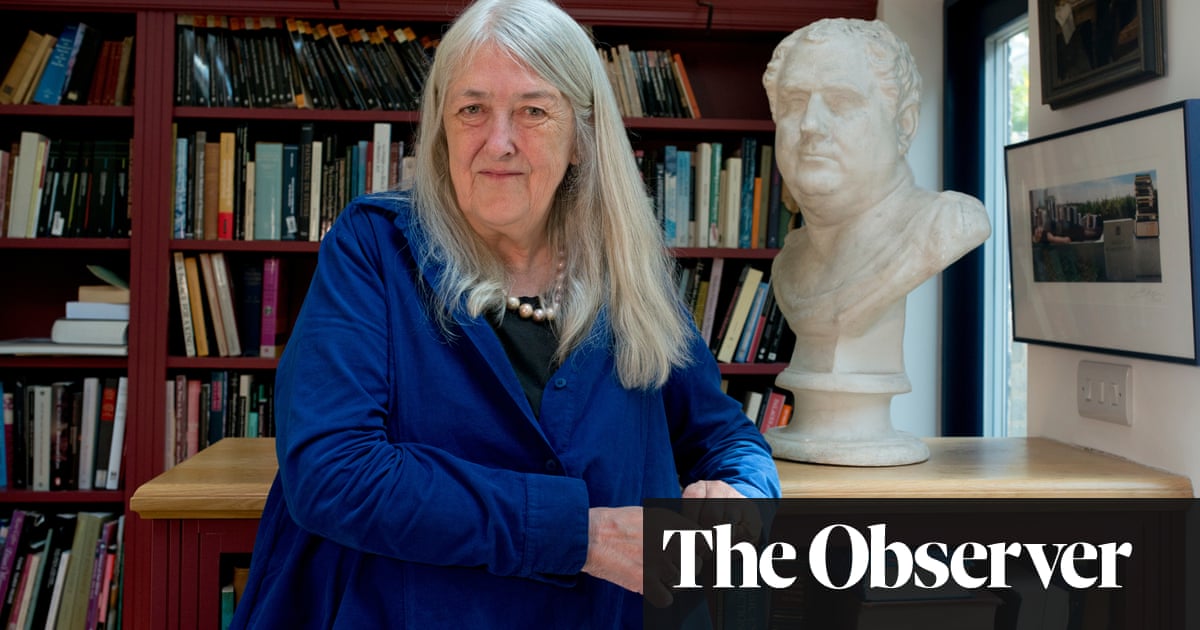
Widely regarded as the world’s most famous classicist, Prof Mary Beard, 68, is a television and radio presenter, trustee of the British Museum, classics editor of the TLS, and the author of more than 20 books on classical history, feminism and academic life, including the bestsellers Pompeii, SPQR and Women & Power. In 2022 she retired from a 40-year academic career at the University of Cambridge. She was appointed a Dame Commander of the British Empire in 2018 and has appeared on programmes as varied as Question Time and The Grand Tour. Her new book, Emperor of Rome, looks at the facts and fictions around the Roman rulers, from Julius Caesar to Alexander Severus.
Where does Emperor of Rome stand in relation to your previous books – I’m thinking of SPQR and Twelve Caesars?
It obviously relates to the Twelve Caesars but that was about modern images of Roman emperors and this is very firmly ancient. It picks up where SPQR left off in a thematic sense, because as I say in that book, for 200 or so years at the beginning of the Roman empire, nothing much changes. So what the new book is trying to do is say – if nothing much changes, how do you go about telling its story?
People have been obsessed with the lives of the emperors almost since the end of the Roman empire – what is it that appeals so much?
Partly they’re larger-than-life recreations of us. They have our faults but they’re bloodier and more lascivious; they have more exciting sex lives, that’s part of it. But also they’ve formed a template of power and what power is since the ancient world itself. So I think we’re curious about how they did it, even if we disapprove.
Did it feel like a timely moment to examine the nature of one-man rule, with the rise in recent years of strongman governments?
I’d like to say yes, but I think in some ways it’s always a timely moment to think about one-man rule and the politics of corruption, dictatorship and autocracy. You can guess that it will have a relevant landing whenever you’re writing.
There’s a recent vogue for retelling the stories of the sidelined women of classical history and literature. Does reimagining their lives help or hinder our understanding of the period?
I think you have to be a bit careful about imagining female power in Rome. Take the example of someone like the Empress Livia, Augustus’s wife. The I, Claudius version is that she poisoned everybody until she got her own son on the throne. I always wonder – I say this as a feminist – wasn’t she a very easy target to blame? One of the similarities you see between ancient and modern politics is the idea that if you want to understand what goes on behind the palace doors, sniff away and there’ll be a woman behind the throne. We do that about Carrie Johnson, maybe completely unfairly.
You retired last year from teaching. Is there a sense of relief at being out of academia?
After you’ve done it for 40 years, it’s not that you think “Phew, thank God I’m out” – I had a great time, it was marvellous, and I feel so privileged that I spent a career doing what I was really interested in. But it’s time to go – I’m now 68 and I’ve got other things I want to do. The next stop’s the care home, so please, let me have another bite at some other cherries before that!
Do you think there is a crisis of free speech in universities?
I think there always has been. It’s an issue that you have to keep looking at, and there has never been a moment in the history of the west when people didn’t argue about who did or did not have a right to speak about something – Socrates was killed for it! There are periods when this seems particularly edgy, and I think there are people who are badly treated, especially in a social media culture, and ultimately end up losing their jobs when they ought to just be someone we disagree with. The last thing I’d want is a world in which we all agreed – that would be awful.
You’ve been an enthusiastic adopter of Twitter. Have you stepped back from engaging as much under the new regime?
When Musk took over I thought to myself, this may be the end of Twitter, and if it is, I’ll say, well, it was fun while it lasted. I’m not going to rush around and sign up for Threads or Mastodon or whatever. I think it was overall a force for good. It didn’t invent simplistic argument – it might have facilitated it but it didn’t start there.
You’ve become a role model to a lot of young women. How does that feel?
Bizarrely, yes! It surprises me. It’s really great to be able to physically demonstrate that you can be my age and make a telly programme on the basis of what you know. That’s hugely important because it’s still something that’s quite difficult for a woman of 18 to think is possible. There’s still a long way to go – equal pay would be a start – but there has been a change.
What might people be surprised to find on your bookshelf?
Tatler.
Which contemporary writers do you particularly admire?
Bernardine Evaristo. I first came across her when she wrote this novel in poetry called The Emperor’s Babe, and I thought, who’s going to write a novel about Roman history in verse, this could be terrible – but my eyes opened and it was brilliant. Ever after I’ve thought she was great.
What books are on your bedside table at the moment?
I’m actually rereading I, Claudius [by Robert Graves] – I thought it was about time. I watched a bit on TV last night – I own it in a box set, but there is something great about thinking you’re watching it at the same time as other people.
Emperor of Rome by Mary Beard is published by Profile (£30). To support the Guardian and Observer order your copy at guardianbookshop.com. Delivery charges may apply
Join Mary Beard for a Guardian Live event on Wednesday 18 October, live in Manchester or via the livestream, when she will discuss her new book, Emperor of Rome. Book tickets here












